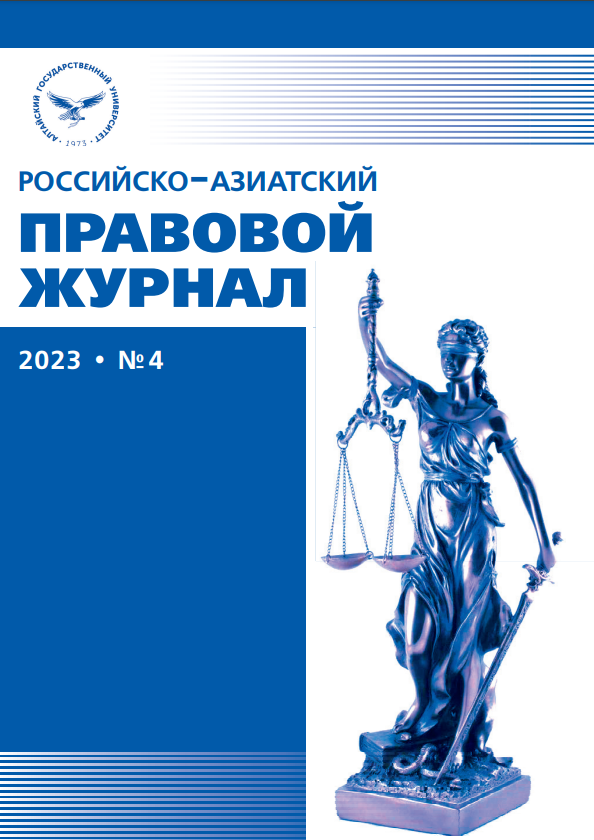TOWARDS THE CRIMINALISATION OF PROMISING/OFFERING A BRIBE AND CONSENTING TO A BRIBE IN KAZAKHSTAN
УДК 342.5 ББК 67.408.142.6
Abstract
At present in Kazakhstan, the increase in the number of corrupt criminal offences, including on the partof high officials, heads of a number of Kazakhstani companies, is due to a stronger political will of the headof state to resolutely oppose corruption. Such a desire allows paying attention to criminal law norms, whichoccupy an important place in the set of measures to combat a systemic vice of the state, jeopardising nationalsecurity. The potential of criminal law in anti-corruption policy has not been exhausted. The discussion ofanti-corruption fight is very relevant against the background of possible implementation of norms of anticorruption international standards into the Kazakh criminal law, which contradict the doctrinal provisionsof the Kazakh criminal law. This study is devoted to the assessment of possible criminalisation of promising,offering and agreeing to receive a bribe in order to strengthen the criminal law fight against corruption. Theproposed changes, in the author's opinion, do not allow to hope that they will ultimately serve the realisationof a useful goal of Kazakhstan's anti-corruption policy, and open the ground for aninformed discussion onfurther fight against corruption.
Downloads
References
Rothstein B., Uslaner E.M. All for one: equality, corruption, and socialtrust // World Politics. 2005. №58 (1). P. 41–72.
Freedom House Kazakhstan 2022. URL: https://freedomhouse.org/country/kazakhstan/freedomnet/2022 (дата обращения: 16.10.2023).
Уголовный кодекс Республики Казахстан от 3 июля 2014 г. №226-V. URL: https://online.zakon.kz/ (дата обращения: 16.10.2023).
О внесении изменений и дополнений в некоторые законодательные акты Республики Казахстан по вопросам противодействия коррупции : Консультативный документ регуляторной политики к проекту Закона Республики Казахстан. URL: https://legalacts.egov.kz/npa/view?id=14093904 (дата обращения: 16.10.2023).
Ferguson G. Global corruption // Law, theory&practice. Third Edition. University of Victoria. 2018. No. 1. 194 р.
Сидоренко Э.Л. К вопросу о целесообразности криминализации обещания и предложения взятки // Общество и право. 2017. №1 (59). С. 40–44.
Крылов Е. Борьба с коррупцией методом проб и ошибок. URL: https://justicemaker.ru/viewarticle.php?id=21&art=1898 (дата обращения: 10.10.2023).
Rose-Ackerman S. The law and economics of bribery and extortion // Annual Review of Law and Social Science. 2010. Vol. 6. P. 217–238.
Davis K.E., Trebilcock M. J. Legal reforms and development // Third World Quarterly. 2001. Vol. 22. No. 1. P. 21–36.
Russian-Asian Law Journal is a golden publisher, as we allow self-archiving, but most importantly we are fully transparent about your rights.
Authors may present and discuss their findings ahead of publication: at scientific conferences, on preprint servers, in public databases, and in blogs, wikis, tweets, and other informal communication channels.
Russian-Asian Law Journal allows authors to deposit manuscripts (currently under review or those for intended submission) in non-commercial, pre-print servers such as ArXiv.
Authors who publish with this journal agree to the following terms:
- Authors retain copyright and grant the journal right of first publication with the work simultaneously licensed under a Creative Commons Attribution License that allows others to share the work with an acknowledgement of the work's authorship and initial publication in this journal.
- Authors are able to enter into separate, additional contractual arrangements for the non-exclusive distribution of the journal's published version of the work (e.g., post it to an institutional repository or publish it in a book), with an acknowledgement of its initial publication in this journal.
- Authors are permitted and encouraged to post their work online (e.g., in institutional repositories or on their website) prior to and during the submission process, as it can lead to productive exchanges, as well as earlier and greater citation of published work (See The Effect of Open Access).








